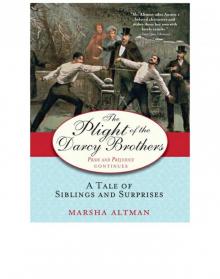- Home
- Marsha Altman
The Plight of the Darcy Brothers Page 5
The Plight of the Darcy Brothers Read online
Page 5
“I will confess something to you, Mr. Bennet, if you would hear it.”
“Is it about my grandchildren being blue?”
“Well, there is that, but this is more pertinent. One of the reasons I am making the offer of this considerable journey is for Elizabeth's sake. I think it would be good for her to get out after…” Even after these months, he could not bring himself to say it, and Mr. Bennet laid a hand on his.
“I had not even considered. You show a great deal of concern for Lizzy, Darcy. You have always impressed me with that. I admit that perhaps my gallivanting across the Continent would not be ideal to my health. But I still cannot ask this of you.”
“You do not have to ask.”
Mr. Bennet sighed. He seemed to be coming to his senses, his fury exhausted, and now was sinking into a depression. “Is there any way I can repay you for all you have done for my family, Mr. Darcy?”
“Yes,” Darcy said, rising to leave and tell the others the news. “You can do me the favor of marrying your remaining daughter off without my help.”
THE D'ARCYS OF NORMANDY
PREPARATIONS BEGAN IMMEDIATELY FOR the Darcys' departure. Time was of the essence, as they might need two months to find Mr. Mastai and then even more time to either drag him back to England (unlikely) or to send a letter with the news of finding him and await its response. All in all, the Darcys imagined that they could be gone for several months, back hopefully in time for the births, which would probably be within weeks of each other.
“I will be honest with you,” Darcy said to his father-in-law. “The best we can hope for is a considerable settlement, if his family is so inclined. If he is already a priest, the discussion will be even more complicated.”
“That I have already realized,” Mr. Bennet said. “Whether you wish to tell Lizzy this or not is at your own discretion. I have no intention of telling anyone else the expected outcome.”
So it was decided. Elizabeth loathed to be separated from Geoffrey, who obviously could not travel with them without slowing them down considerably. Darcy assured her that, at two, Geoffrey was quite old enough to be on his own for a bit, and that their absence might even do him some good. “We do have a general tendency to spoil him.”
“And you think Bingley will not?”
Darcy only smiled at her from behind his desk, where he was gathering the papers he thought he would need.
“You don't think there's any chance of having Mr. Mastai return to England with us, do you?” she said.
“No,” he answered. “I will not encourage unreasonable expectations. If we can even locate him in time, he will probably either have taken vows or be so intent on taking them that our best hope is a settlement.”
“He did offer her something in France.”
“I imagine now that he is faced with her family, perhaps even willing to throttle his collared neck, he will offer more,” he said. “How much, I have no idea. The point is, we will not let this injustice pass by.”
Elizabeth seemed satisfied by this answer and left him for the moment to return to her own packing. Darcy had no further intrusions until there was a knock on the open door. “Come.”
It was Mrs. Reynolds, not an unexpected face in the hurry of packing, as the Master and Mistress of Pemberley were to go on a long and unexpected journey. “Mr. Darcy.”
“Mrs. Reynolds.”
“I seem to recall—it's been some time since you've been to the Continent.”
“Yes,” he said. “I went only once, after college and before my father's death. I was not particularly enamored of it. Why do you ask?”
“I was just wondering—do you intend to stop at the mansion in Valognes?”
“The Hôtel des Capuchins?” Generations back, it had been the old d'Arcy estate, or so the history went, and had been held by very distant relatives of his until the Revolution, when they fled their home. Now an imported English family owned the mansion and ran it as a hotel. The head of the family was a military officer who had taken a liking to the mansion while stationed there to fight Napoleon. Darcy had stayed there for a few days in their company during his journey to the Continent, and the family held him in esteem.
“I suppose we would shelter there for a night or two,” he replied. “I admit to not having a formal itinerary at the moment, but if Valognes is on the way, then yes.” He thought about it. “Why do you ask?”
“Well—it's probably nothing, Sir, but I do recall your father mentioning to senior Mr. Wickham that he had some financial papers there of some import. They may have been burned in the Revolution… I don't know. I was just askin' if you know anything about them.”
Darcy stopped his work for a second and looked up at her. “No. I mean, yes, there are piles and piles of old papers there going back centuries, because the mansion itself was not burned when my relatives fled. But I did not peruse them while I was there, nor was I told to do so by my father.” But come to think of it, that had been before his father's illness and death, and young Master Fitzwilliam had been given a year to explore and have fun before settling down to the serious matters of learning to be the real Master of Pemberley and Derbyshire. His father might not have mentioned the need to view the financial papers, or Darcy might have simply forgotten about it and so had his father. “I suppose, if there is time, I will look into it. Thank you, Mrs. Reynolds.”
She curtseyed and let herself out. It was not until he was returned to his sorting that the oddity of the conversation descended on him.
“I don't understand,” Elizabeth said later that night in their bedchamber—or, properly, her bedchamber. “Why do you find that so odd?”
“Despite being the housekeeper, Mrs. Reynolds is not involved in the financials of Pemberley,” he explained. “Her knowledge extends to a certain idea of how much the servants beneath her in the house are paid. At times, I have asked her advice in deciding on the salary of a new employee, as she is given the task of choosing certain ones herself, but I always make the final decision and do not always tell her.
“The only way she would even know about these financial papers in France is if she happened upon a conversation between my father and his steward, or if my father specifically told her for some reason that I cannot imagine. More to the point, Mrs. Reynolds has never, in my life, approached me about anything pertaining to my family's personal finances. About hiring and firing hands, yes. But my father's personal accounts?” He shook his head. “It was just an odd thing for her to do.”
“Are you saying there may be more to it?”
He smiled. “You are always a step ahead of me.”
“In some countries, wives walk two steps behind their husbands, I think.”
“Thank God, then, that we are not in one of those countries.”
He climbed into bed with her, still temporarily dressed.
“Do you think it will be all right with Geoffrey? To leave him now?”
“We will not be gone so terribly long,” he assured. “And he is certainly old enough. Who knows? It may do him some good.”
“Are you implying something is wrong with our son?”
“It could hardly be from my side.”
“I thought we had established that it was.” She kissed him on the head. “Colonel Fitzwilliam implied that Geoffrey's behavior was not, in fact, from the Bennet lineage, and that you were quite the savage in your days as a child.”
“Clearly, then, I cannot allow you to visit my cousins again, because Richard is spreading bad rumors about me that are entirely untrue.” He swallowed. “Or may be true, to some extent. Perhaps.”
“Perhaps?”
“Perhaps. And that is all I will say on the matter.”
As she settled down on her side of the bed, Elizabeth added, “You do not have to do this. Just because of your history of saving the Bennet family reputation, you are not obligated to save Mary from her own stupidity.”
“She is my sister, and therefore, I do feel the obligation. I
doubt I can 'save her,' if that is what you mean. But this is for you as well, Lizzy. Surely you realize that. Since you have never been out of England—”
“I have been to Scotland.”
He smiled. “—Never been out of Britain and are available to travel, so why not? When will we have this opportunity again, even if our travels will be a bit rushed? I should think you would like to see some of the glorious sites—” But that was when he noticed the shift in mood, and the tears slipping out her eyes like stray water over glass. “Lizzy—”
But she leaned over and could not hold back from sobbing into his nightshirt. When others had cried over the situation with Mary, she had not. She had held it in, perhaps feeling some obligation to do so. But he knew, very well, it was not entirely Mary she was crying over. “I love you.”
“That does not change it. It does not change why… why I am so available.”
He frowned, but she didn't see it, leaning on his shoulder as she was. He frowned because he didn't know how to answer her. “Lizzy, you have already given me everything I could ever want in my life. No more is required of you.”
“Very well then. So my life is about giving to you? What about what I want?”
That he could not give her.
“We both—we both know you are perfectly fine,” he said. “And that—it is only a matter of time. The traveling will be good for everyone, I believe. Good for us, good for Mary, good for Geoffrey… Can you not see that? That is why we are going— not to get money from some Italian priest and his family.”
This seemed at least to appease her, because she pulled away from their tight embrace and was no longer sobbing. “I'm sorry. I'm being a foolish girl.”
“No, you are being a heartbroken woman, which is a very mature position to be in. This is something all mothers must suffer, while all husbands have to sit by helplessly and wish we could mend it, but we can't. On this, I cannot help—though I am willing to try very hard.” He kissed her hand. “Lizzy.”
She laughed, and the mood in the room changed. The heaviness was gone, at least for a time, as she wiped her eyes and kissed him. “And we have the added benefit that upon our return, our son will be his normal color.”
“Or another one entirely.”
Packed and ready as they would be, the Darcys returned from Pemberley carrying Geoffrey's things, as he would be staying with his aunt and uncle, if very reluctantly. Normally happy to visit them, he had to be dragged out of Pemberley quite physically this time by his father and his nurse. At last they arrived at Chatton, and the final preparations were made, so they could depart to Town and then take a ship to France from Dover. The route would vary, based on information collected on the road, and a guide would need to be hired, so Darcy had his steward free up a good amount of cash.
They also needed to learn all of the specifics of this man— Giovanni Maria Mastai-Ferretti—from Mary, as she knew them. He would likely be in school or visiting extended family in Rome. Dr. Maddox noted that Rome was a hot, unpleasant city in the summer months, and that most wealthy people retreated to villas elsewhere, often including the Pope himself.
Mr. Bennet was not willing to let Mary out of his sight, so the Bennets also would stay at Chatton. The Maddoxes would be in Town until Caroline's own confinement, and possibly during, as the good doctor was tied to London by his work.
“Oh, Mr. Darcy, you are so good to us,” Mrs. Bennet said. “And to Lizzy. Keep her safe on those roads.”
“It will be my first duty, Mrs. Bennet.”
Mary had one last thing for them—a Catholic rosary. “From him; if you need to prove who you are. I didn't ask for it—I don't use it—but he gave it to me.” It was a fine item, too, with a tiny, silver figure of Jesus on the cross, and the beads were a beautiful red.
“Thank you, Miss Bennet,” Darcy said, and bowed to Mary.
Three couples and two children waited for the carriage that would take the Darcys on the first leg of the journey, as the Bingleys insisted on seeing them off. With many tearful goodbyes, they were finally off, on the way to say good-bye to one last person—Georgiana Darcy.
“You will take care,” Darcy said to his sister, standing in their townhouse, as the last vestiges of business had taken some two days to contract. “And if anyone—”
“We will wait for your consent.”
“Good girl.” He kissed her on the head.
“So you have finally agreed that I may eventually get married? Maybe Elizabeth has softened you, Brother.”
He smiled. “No, I just decided that I would not want your beautiful hair hidden under the veil of one of those horrible black nuns' habits.”
“Now you are toying with me!”
“Perhaps. Do you wish me to get out my sword and have my manservant hold it up in front of you in my absence instead?”
“It would be more familiar, but no, Brother.”
It was then that Mrs. Maddox appeared. “Daniel will be on his way in a moment. We wish to give you this, Darcy.” She handed him a book, very small and old, with its title worn off from obvious use. He flipped it open and found a stamp of the seal of the earldom of Maddox on the inside cover. It was a travel-sized book of Italian words and phrases, very light and usable. “He says he can no longer read the print, so it is as good as yours.”
“I am honored,” he said, knowing full well how much Dr. Maddox treasured his books and his eyesight, the latter of which was—as Darcy had been told privately—in slow deterioration.
The doctor appeared quickly to wish them well and give them a paper full of various contacts they could use and places they could stay in France and Italy. “I don't know how good they'll be. They're a bit out of date. But if you use even one…” He shrugged. “I wish to be of more help than that.”
“I think you are needed more here,” Darcy said, patting him on the shoulder. “Good luck, Doctor.”
“I would say the same to you.”
“But we mean it for different things. Now if you will excuse us, our ship leaves at noon.”
“Brother! Must you go today?” Georgiana begged.
“The sooner we leave, the sooner we will be home.”
They said their good-byes and joined the Bingleys at the awaiting carriage. “I expect you to be a proper gentleman when I return,” Darcy said to his son. “But I will not hold my breath, for my own sake.”
His blue son scowled at him. “I wanna go!”
“One day, you will, but not today. It's not safe.”
“Is it safe for Mother?”
“Yes. Your mother is a hardy woman,” he said, and noticed the resulting glare from Elizabeth. “I meant it as a compliment!”
Elizabeth shook her head and shooed him away, kneeling so she was at eye level with her son. “Be a good boy to your aunt and uncle. I know you have it in you, and they will be so worried for us that you should not tax them. Look at you,” she said, straightening his hair, which was a slightly darker hue of blue than the rest of his body. “All grown up. And… blue.” She hugged him. “Keep an eye on Georgie. She… we worry about her.”
“Why?” Geoffrey said.
“Because—she doesn't talk.”
Her son's expression was bemused. “She talks to me.”
They were out of earshot of the Bingleys, who were talking to Darcy. Elizabeth looked up at them and back at her son, and then whispered, “She does? Like normal people?”
He squirmed in her grasp. “She tol' me not to tell.”
“Why would she do that?”
Geoffrey shrugged.
“Well, when someone makes you promise something… I suppose you ought to keep it,” she said. “So it will be our secret for now. But do tell her to say something to her parents. Will you promise me that?”
He nodded. He was so adorable when he did that. He was so adorable when he did everything, and she would miss… She could not imagine it. It was too painful.
“Mummy,” he said. “Don't cry.”
She had to part from him. She stood up, and hand-in-hand, they walked to the others. “Such a long journey,” Jane said.
“Well, the Continent is not actually very far. I hear you can swim to it,” Bingley said. But for the Bingleys, it was worlds away. He turned towards Darcy, who took him aside, as the sisters said their good-byes.
“Best of luck,” Bingley said, offering his hand, into which Darcy placed a set of keys. “What are these?”
“The master keys to Pemberley. I know you don't need them to get in, but do put them somewhere safe.” Darcy looked uncomfortable, almost as if he was at a ball or something. “Bingley, I'm sorry for dragging you to Town to sign the papers for my will—”
“I'm honored,” Bingley said, leaving out at least vocally that Geoffrey Darcy would go to his care until he reached the age of majority, should something happen to his parents. These arrangements, which had to be formalized on paper with signatures and witnesses, had been done in some secrecy the day before in a small office in the city.
“I would say, 'Don't be too hard on the boy,' but I know that it is an impossibility. So I would say, 'Don't be too easy on him.'”
“Are you saying something about my parenting abilities?”
“I'm saying more about my son,” he assured his brother-in-law with a slap on the back.
Their departure could not be put off any longer. There were hugs, and Georgie waved and Geoffrey pouted, but finally Mr. and Mrs. Darcy were able to climb into the carriage, bound for Dover, where the ship would take them to France. They waved, and between their son's skin hue and Bingley's red hair, they could get a good view of their beloved family until the London smog blocked their vision.
“Five shillings says we return and they're all blue,” Darcy said.
“Red,” his wife said. “I'll put five shillings on red.”
As London disappeared behind them, they shook on it.
THE ACCOUNT IN QUESTION

 The Knights of Derbyshire
The Knights of Derbyshire Other Tales: Stories from The Ballad of Gregoire Darcy
Other Tales: Stories from The Ballad of Gregoire Darcy The Ballad of Gregoire Darcy
The Ballad of Gregoire Darcy Mr. Darcy's Great Escape
Mr. Darcy's Great Escape The Darcys and the Bingleys
The Darcys and the Bingleys The Plight of the Darcy Brothers
The Plight of the Darcy Brothers The Road to Pemberley
The Road to Pemberley